The Global Health Security Agenda (GHSA) was launched in 2014 to drive multilateral, multi-sector prioritization and coordination of global health security. By definition, GHSA was designed to enhance country capacities to prevent, detect and respond to infectious disease outbreaks; emphasize global health security as a national leader-level priority and galvanize high-level commitments to global health security; promote multi-sectoral engagement and collaboration; and focus on common, measurable targets.
The GHSA is now at an inflection point. While GHSA has built a strong community, the COVID-19 pandemic has also stress-tested domestic and global health systems and raised questions about the reach, relevance, and impact of this partnership. Despite its success as a forum for collaboration and incubator for health security concepts and networks, GHSA has been less visible as part of the global response to the COVID-19 pandemic, missing an important opportunity to activate its coordination mechanisms to support global policy discussions on the future of the global health security architecture.
As the GHSA 2024 Framework enters its final year in 2023 — and as global leaders advance a range of instruments and mechanisms to make the world safer from emerging pandemic threats — now is the time to reflect on the lessons learned from the GHSA and its role in the evolving global health security architecture. The establishment of the Financial Intermediary Fund for Pandemic Prevention, Preparedness, and Response (Pandemic Fund) at the World Bank, the Intergovernmental Negotiating Body on a Pandemic Instrument at the World Health Organization (WHO), and the UN General Assembly’s resolution to hold a High-level Meeting on Pandemic Prevention, Preparedness, and Response in 2023 all offer new promise to elevate the health security agenda. In light of these developments, GHSA members should reach a clear decision on the future of the partnership by the end of 2022 and ensure that the GHSA both informs, and is informed by, decisions made in these other fora, as part of a more systemic set of reforms to strengthen global health security and governance.
Developed in partnership with the Global Health Security Agenda Consortium, NTI:bio, and Pandemic Action Network, this paper draws on reflections and feedback from a wide range of stakeholders engaged in global health security to assess the successes, challenges, and constraints of the GHSA’s structure and make recommendations for its future and the future of multi-stakeholder engagement for health security.
Read the full paper.



